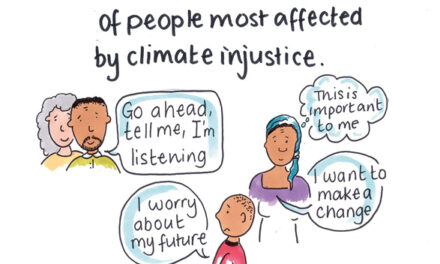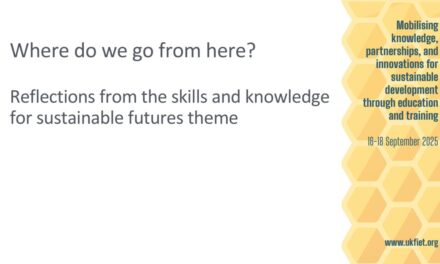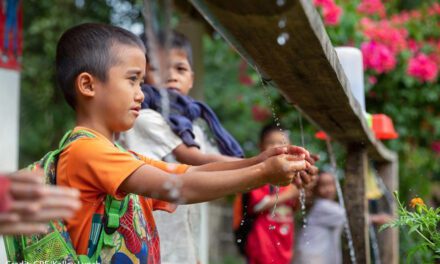Interview with theme convenors of one of seven UKFIET 2025 conference themes, ‘Climate and environmental justice’: Rachel Wilder, University of Bath, and Fernanda Gándara, Room to Read. The Call for Abstracts is open until 21 March 2025.
What excites you about your theme?
Making fast progress in climate and environmental justice is more urgent than ever. Education has not adapted quickly or boldly enough to deal with the challenges that our ecosystems face, and we are excited for the opportunity to elevate creative and meaningful solutions to a problem that otherwise will not be resolved.
Climate and environmental justice are all-encompassing, affecting everyone from young children to adults, from rare species to entire ecosystems, from the air we breathe to the food we share. By extension, education that aims to disrupt the current climate crisis can happen in formal settings or informal ones, in early education programmes or in lifelong adult education. No one is immune to the climate crisis, and we all have opportunities to make things more just. Though some people, undoubtedly, are better positioned than others.
Environmental and climate justice is an area where innovations are often incubated outside of formal schooling and growth has been organic and sideways, before spreading up and out. Transition trajectories have been unconventional and there is much to learn here for environmental education as well as other, often-neglected areas of education including gender equality, anti-racist education and activist education. We think that at the core of this learning is an energetic and profound curiosity about what it takes to transform basic assumptions about what education is for.
How does your theme connect to the overall conference and today’s global landscape?
The current global geo-political landscape is highly volatile, and this means that political will for climate action is neither steady nor progressive on the whole. Contrary to expectations, the UK government is supporting the development of a third runway at the country’s largest airport and the US government has decided to immediately halt support for environmental programmes, with deep, global ramifications.
On a positive front, in 2024 we saw one of the most coordinated efforts for environmental education to date – the UNESCO-led Greening Education Partnership – culminate in the publication of some key standards for ‘greening education’. These defined justice as a core pillar – a welcome innovation in global frameworks. Global initiatives such as this are important for mobilising political will and fostering communities of practice, but nevertheless, we see reductionism as a potential risk in global guidelines.
A central theme of this conference is harnessing local, regional, and global perspectives. As part of this, we invite participants to share examples of education that embed the complexities of the climate and ecological crises, of competing knowledge systems and approaches, and of conflicting experiences of hope, fear, and joy. Climate and environmental justice invoke multiple principles and contexts: how have you witnessed these connections in your policies or practices? And in spite of the complexity, how do we mobilise knowledge across disciplinary, cultural and sectoral divides to create resilient communities and collective action?
What kinds of papers/sessions would you like to see submitted under your theme?
One thing is clear, we cannot keep relying on the same old solutions to a problem this urgent and severe. We ask researchers to be more disruptive, more creative, and more impatient – not only in their thinking but in their partnerships and efforts to translate knowledge into action. Accordingly, we are particularly interested in submissions that use creative and dialogic formats, which recognise the potential in the room for new meaning making.
Educational conferences should not just be spaces for discussion — they must be platforms for disruption, innovation, and co-creation. We invite submissions that directly challenge the injustices embedded in dominant narratives and mainstream epistemologies. How can climate education and action meaningfully integrate indigenous knowledge, intergenerational wisdom, and diverse community perspectives and experiences? Are today’s climate solutions truly collective, and do they decentre knowledge?
We seek to encounter methodologies that grapple with the contradictions that characterise the climate crisis—the fear and hope, urgency and inertia, responsibility and displacement. How are educational institutions—including funders, policymakers, and think tanks—taking real responsibility for the crisis, rather than shifting the burden onto the most vulnerable? Who holds the power to act, versus who is expected to adapt and mitigate?
We also invite submissions that confront the deeper implications of climate education for the natural world itself. Can climate education move beyond human-centered narratives to embrace biocentric justice — the rights and entitlements of the natural world? Too often, research and practice fail to critically engage with this paradigm, leaving the concept of biocentric justice underexplored and underapplied.
Indigenous communities have long led the fight to protect natural resources, with some nations recognising sacred lands, rivers, and ecosystems as legal persons. Yet often, climate education and solutions lag behind. What would it mean to reimagine climate education in service of the planet—not just people? How can learning frameworks reflect an ethics of reciprocity, respect, and restoration?
We seek bold contributions that challenge anthropocentric norms, uplift community leadership, problematise the role of education, and push the conversation toward a radical rethinking of our relationship with the natural world. A full list of topics can be found here.



